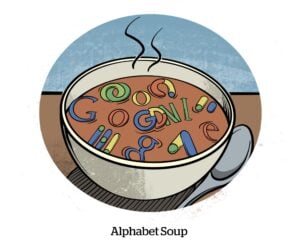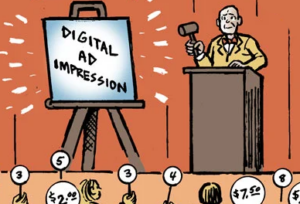Pry-vacy Cases
The myriad antitrust cases filed against Silicon Valley giants rarely result in legal action. Mostly what you see are record-breaking fines – for the regulators, that is. But these fines hardly break the bank for Big Tech. What’s $300 million here and $1 billion there? It’s monopoly money, after all. More often the darts that stick come from exposed internal emails. Apple won nine out of 10 counts in its case with Epic, and it’s appealing the tenth. But the toothpaste can’t go back in the tube when it comes to emails divulged during the trial, many from years and years ago, that paint Apple execs as callously indifferent to developer complaints. And now the antitrust case against Google spearheaded by state attorneys general in the US may have unearthed useful material for investigations by European counterparts, The New York Times reports. One Google memo said the company has “been successful in slowing down and delaying” the EU’s ePrivacy Regulation and was “working behind the scenes hand in hand with the other companies” in order to do so. Those lines probably felt like standard fare at the time, but may come back to haunt them. Another email reveals Google’s wary dealmaking with Microsoft.
Braze The Roof
Another day, another ad tech or mar tech IPO. Up next: mobile-focused customer engagement platform Braze. The company filed a registration statement with the SEC on Friday to raise up to $100 million for its initial public offering. Read the release (and if you’ve got lots of time on your hands, here’s the S-1 for good measure). No pricing terms were disclosed as of yet, but its ticker symbol will be “BRZE,” in case you’re curious. According to its S-1, Braze generated $150.2 million during the past year, up from $96.4 million for the previous fiscal year, a 56% year-over-year increase. Braze alludes to the reasons for this growth and, you guessed it, COVID-19 played a big role. Combined with the ever-growing abundance of options available to consumers, the pandemic accelerated the overall shift toward mobile and digital transactions. Marketers can only hope to keep up. In other IPO news: Centro – sorry, Basis, the company changed its name last week – confidentially submitted a draft registration statement S-1 last Thursday. [AdExchanger has more on that.]
Which Side Of The Track?
Digital media and news publishers have trimmed their ad tracker counts. Services like Ghostery, not to mention built-in browser tools, call out publishers for enabling dozens of obscure vendors. But nonprofits, even some of the most recognizable, are riddled with ad trackers and have become major data sources for third-party data intermediaries, The Markup reports. It’s a delicate issue. These remarketing tags and tracking pixels segment users for ad targeting, and many nonprofits might inadvertently expose sensitive information. Think Planned Parenthood, addiction services or groups dedicated to mental health crises. But nonprofits need the advertising tools, said Tracy Plevel, VP of community development at Gateway Rehab, one such organization. “We are up against for-profit providers with large advertising budgets as well as the addiction treatment brokers who grab those seeking care with similar online advertising tactics and connect them with the provider who is offering the greatest ‘sales’ compensation.” That is not a good look, for anyone.
But Wait, There’s More!
The buy now, pay later leader Klarna acquires the online trip planner Inspirock. [TechCrunch]
Kroger Precision Marketing’s Cara Pratt on the convergence of commerce and content. [Digiday]
Here’s a new academic paper from Garrett Johnson, Eric Seufert and Julian Runge: Privacy-Centric Digital Advertising: Implications for Research. [SSRN]
Google charges more than twice its rivals in ad deals – and wins 80% of its own auctions. [WSJ]
And in other Google news, Google just pulled its YouTube apps from Roku devices following a months-long dispute. [Insider]
Instagram is testing tools to make it easier for creators to find sponsors. [Engadget]
“We need to have this knife fight”: An internal Facebook plan reveals the machinations of a company determined to fend off Apple’s new privacy control. [Puck]













